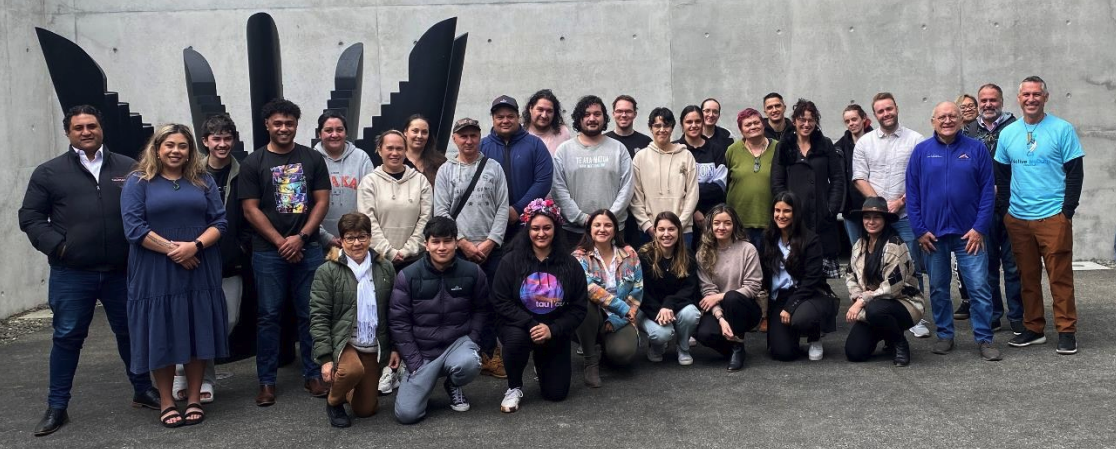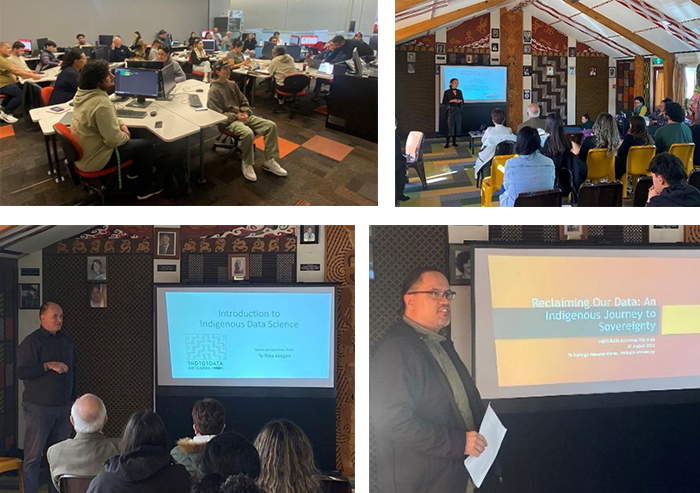Empowering Indigenous voices: NeSI reflections on the Indigidata Aotearoa 2023 wānanga
Upon the recent release of a post-event report of Indigidata Aotearoa 2023, a groundbreaking wānanga aimed at advancing Indigenous data science and sovereignty, we wanted to take a moment to reflect on the event and NeSI's involvement.
From 21 to 24 August 2023, Te Whare Wānanga o Waikato / University of Waikato hosted Indigidata Aotearoa, an inaugural wānanga that brought together 23 Māori participants from diverse backgrounds, creating a platform for robust discussions and knowledge-sharing with some of Aotearoa New Zealand's leading researchers.

Responding to community needs
In recent years, there has been a notable surge in the fields of Indigenous data science and sovereignty.
The Indigidata Aotearoa program was designed to equip Māori participants, including tauira, kaitiaki, and kaipakihi, with the necessary understanding of technical, ethical, and cultural issues surrounding research in Aotearoa New Zealand. This initiative is vital to ensure that all research conducted in the country involves meaningful consultation with Māori.
Indigidata Aotearoa fostered collaboration among post and undergraduate students, representatives from Iwi Māori organizations, corporate entities, and community members.
A focused and impactful programme
The wānanga kicked off with a warm welcome to Hamilton Kirikiriroa, featuring a reception dinner and whakawhanaungatanga. The next day, proceedings officially commenced with a field trip to Tūrangawaewae Marae in Ngāruawahia, attending the official Karakia o te Kīngi Māori at the annual Koroneihana.
Over the following three days, the schedule was packed with coding sessions, enlightening discussions on Maori data sovereignty, and a creative immersion into the world of eSports.
As the wānanga concluded, positive feedback poured in from attendees who appreciated the depth and breadth of knowledge shared throughout the event. The connections made, the insights gained, and the cultural immersion contributed to a transformative experience for all participants.
Participants engaged in enriching discussions with esteemed researchers, including Dr. Kali Dale, Associate Professor Maui Hudson, Associate Professor Te Taka Keegan, and others. These sessions provided a unique opportunity for participants to delve into the depth and breadth of Indigenous data science.
A special highlight of the wānanga was the presence of the esteemed international Keynote Speaker, Dr. Kali Dale. Hailing from Bemidji, Minnesota USA, and a citizen of the White Earth Nation of Ojibwe Indians, Dr. Dale is an expert in Indigenous Data Science and Indigenous Data Sovereignty. Her insights and expertise added a global perspective to the discussions, enriching the experience for all participants.

Contributing NeSI expertise
Members of NeSI's training team collaborated with Genomics Aotearoa to host two sessions that helped participants build practical digital skills for research:
- Coding session: Introduction to Bash
Dinindu Senanayake (NeSI) / Dr Tyler McInnes (Genomics Aotearoa) / Dr Nisha Ghatak (NeSI)
Participants learned to navigate the file system, organise (copy, move, rename and delete) files, and automate tasks.
- Workshop: R
Matt Bixley (NeSI) / Dr Tyler McInnes (Genomics Aotearoa) / Dr Nisha Ghatak (NeSI)
R is used worldwide in scientific fields as a powerful language for asking statistical questions and creating publication-quality figures. Participants built an understanding of how R can be used to hold and manipulate data while identifying medically relevant genetic variants that show population-specific differences. They also learned how to use R to create stunning visualisations of data using R’s “Grammar of graphics”.
To build awareness of how participants can help spread digital skills training to others, NeSI hosted a talk explaining our partnership with The Carpentries, a global community for teaching foundational coding and data science skills to researchers:
- Lightning Talk: Introducing The Carpentries
Dr Nisha Ghatak (NeSI)
This lightning talk was centered on presenting the value of The Carpentries curriculum to indigenous scholars present at the event. It highlighted how indigenous scholars could leverage NeSI's parternship with the Carpentries to access skill development opportunities, such as instructor training certification and various Carpentries workshops.
Lastly, joined by representatives from Genomics Aotearoa, REANNZ and Te Whare Wānanga o Waikato / University of Waikato, NeSI Director Nick Jones also led a panel discussion to facilitate discussions around kaupapa and technology. The session allowed attendees to delve deeper into questions around personal history, understanding of technology - one of the integral themes at this wānanga.
Community collaborations at work
Te Kotahi Research Institute, the organizing body behind Indigidata Aotearoa 2023, expressed gratitude to all the contributors and sponsors who generously supported the event. Funding from institutions such as NeSI, REANNZ, Genomics Aotearoa, TAIAO, and Tikanga in Technology research programs played a crucial role in making this wānanga a reality.
Indigidata Aotearoa 2023 stands as a milestone in advancing Indigenous data science and sovereignty in Aotearoa New Zealand.
NeSI takes pride in its contribution to fostering collaboration, insights, and cultural exchange during this wānanga. These efforts play a pivotal role in empowering Māori participants, enabling them to actively contribute to research and engage in discussions within the dynamic realm of Indigenous data science.
If you're interested in learning more about NeSI's interest and activities in this space, please get in touch.
To read the full post-event report, visit the event website.





